
The Case for Seeing Animals As Rape Victims
An Animal Rights Article from All-Creatures.org
FROM
Amanda Houdeschell,
SpeciesRevolution.org
July 2018
So here's a question to all those of you who changed your status to #MeToo - How many of you are vegans? And those of you who are not, how fair is it to raise your voice against atrocities on yourself or your kind, but endorse and encourage the same on the female of other species? Don't get me wrong, I do not tolerate physical or sexual abuse, I truly empathise, am ashamed and disgusted, just that I apply it to all.
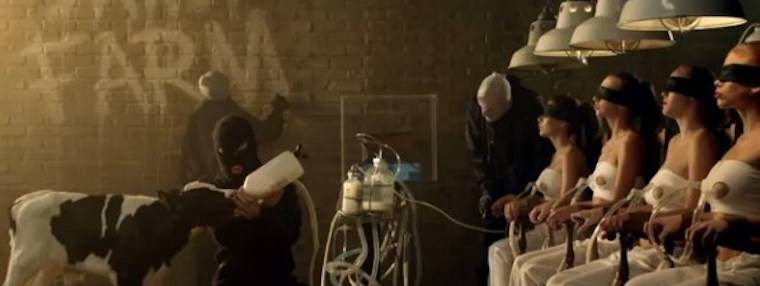
From Pink's "Raise Your Glass" video
And How to Respectfully Advocate for All...
As I write this, and as you read this, my wish is for us all to remember
that we have never experienced non-humanness. I write as a rape survivor who
is doing her best to amplify the voices of nonhuman rape victims. One of the
most heart-wrenching experiences for me post-trauma, is people telling me
that what happened to me isn’t really rape. With the knowledge that all I
can do is make assumptions about certain nonhuman interests, I believe that
to include animals as victims of sexual trauma is the only way to do their
experiences justice.
Below are some of the most common justifications for not including animals
as rape victims, and why I believe these to be nothing more than speciesist
deflections of addressing the problem at hand.
“Farmers do not think of breeding as a form of abuse.”
Abusers need not think of themselves as abusers in order for their actions
to be viewed as ubiquitously wrong. Studies show that men still don’t know
what consent is, but that does not excuse unwanted sexual advances. Those in
positions of power — whether they be men, straight people, whites, or humans
— have a responsibility to research how to appropriately interact with their
marginalized counterparts.
This is because simply not knowing is not a valid excuse. In Coming to
Understand: Orgasm and the Epistemology of Ignorance, Nancy Tuana states
that ignorance “should not be theorized as a simple omission or gap but is,
in many cases, an active production. Ignorance is frequently constructed and
actively preserved, and is linked to issues of cognitive authority, doubt,
trust, silencing, and uncertainty.” She goes on to say, “It is important to
be aware of how often oppression works through and is shadowed by
ignorance.”
Men do not just accidentally grow up never having been taught about consent.
Farmers don’t just happen to be unaware of the suffering they are causing.
There are systems in place — patriarchy and human supremacy, respectively —
that cause this knowledge to be swept under the rug and not be a priority.
Ignorance of respectful relationships between men and women, humans and
animals, has been constructed in order to keep women and animals as
subordinates to the human supremacist patriarchy.
This is also giving abusers the benefit of the doubt, assuming that none of
them are in any way aware of the consequences of their actions. While this
may be the case in many circumstances, it is worth mentioning that there are
animal exploiters who are completely aware of the harm they are causing, and
do not care. Psychologist Harry Harlow named the contraption he used to
force female monkeys to mate the “rape rack.” In the same manner, Harlow
created what he called the “pit of despair,” a place of complete social
isolation for baby monkeys.
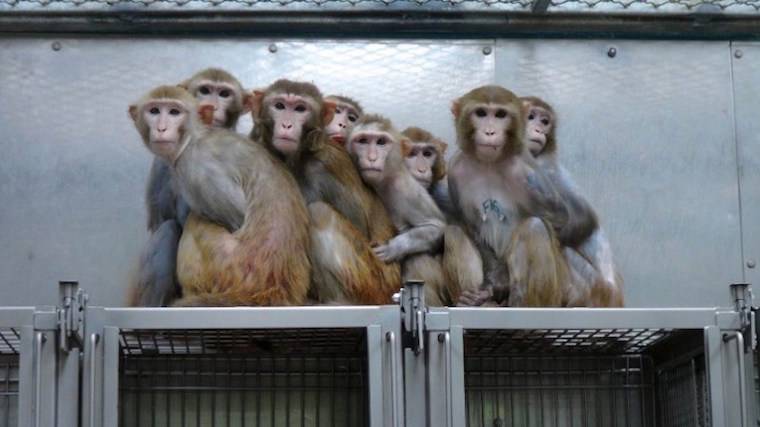
Mother monkeys, victims of maternal deprivation experiments at NIH.
Source:
PETA - NIH National Institutes of Health.
“The rape comparison is disrespectful to survivors.”
This assertion assumes that animals are not included in the category of
survivors, but we'll put that aside for a moment and read this as being
disrespectful to human survivors. As could probably be predicted by the huge
number of survivors, we are an extremely diverse group of people. People of
all ages, genders, races, political affiliations, belief systems, countries
of origin, etc are victims of rape. While certain generalizations to help us
recover from trauma might be appropriate, expecting that all of us will find
the same things offensive disregards our individuality. There are many vegan
women who find speaking out about nonhuman rape to be important, and even
empowering, work.
Furthermore, let us abolish the word “comparison” from this conversation.
Anti-speciesist feminists are not comparing the experiences of animals to
our own experiences. We are extending the definition of rape to include
people of all species. The definition of rape is constantly being expanded
in order to encompass victims who have been silenced: wives raped by their
husbands, male victims, and victims who were coerced, to name a few. It is
healthy and vital that social justice advocates, lawmakers, and the general
public consistently analyze their inclusivity and make changes accordingly.
“Rape is about power and control while dairy is about profit.”
What is incredibly disturbing about this statement is the pronouncement that
profit is somehow not a form of power. Have we become so insistent on the
exclusion of animals that we have forgotten all of the human victims of rape
for profit? Is sex trafficking not a form of rape? The same people who are
outraged by the institutionalized exploitation of women in The Handmaid’s
Tale and Mad Max: Fury Road — stories that depict women kept as breeders —
maintain that breeding animals is not a form of rape.
Plenty of nonvegans believe that bestiality — when defined as a human
having sex with a dog or a horse or other more admired animals — is rape.
The discussion is pretty clear-cut: Animals cannot consent to humans. It’s
not a hot button issue; even if someone is uncomfortable with using the word
rape, they seem to still understand that it is a violation of a sexual
nature.
Why, then, do even the most outspoken ethical vegans recoil at identifying
the victims of industrial sexual violence? Dogs in puppy mills and cows on
dairy farms are abused by a system that profits off of their sexual
exploitation, but they are ignored as fellow victims far more vehemently
than individuals who suffer rape from one single human.
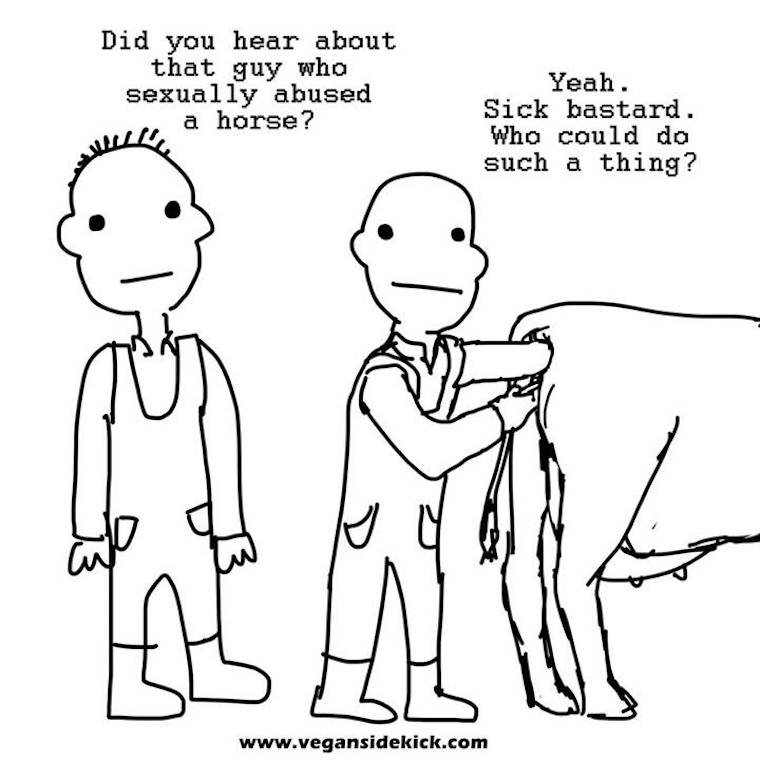
“Animals do not suffer from PTSD.”
This is simply factually incorrect. Scientists have observed evidence of
animals experiencing the effects of post traumatic stress disorder (PTSD).
Eslom the chimpanzee lost his mother and suffered a serious physical injury.
Afterwards, he disappeared and cut himself off from his community. “When he
returned, according to case reports, he was different: quick to anger,
easily irritated, taking an unusually long time to calm down. He was more
fearful, had a harder time sleeping. He pulled away from his old friends.”
Eslom’s story is not a rare case, either. From dogs who have been shot by
police, to orangutans who have been kidnapped and sold into sex slavery, to
cats who have survived bombings, there are dozens and dozens of accounts of
nonhuman animals struggling to recover from traumatic events.
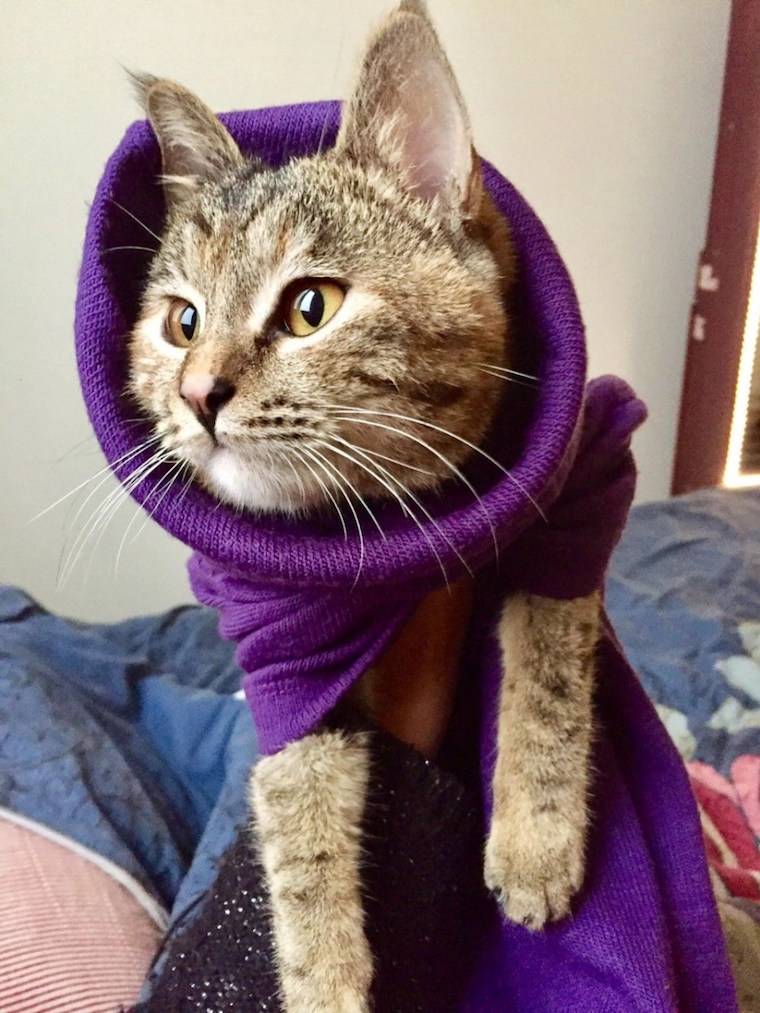
Lola, a nonhuman victim of PTSD
But while we have debunked this speciesist myth, it is important to
address that this assertion, with its intent to mock nonhuman abilities, is
problematic for humans too. According to the Department of Veterans Affairs,
around 60 percent of men and 50 percent of women will experience some kind
of traumatic event over the course of their lifetimes, but just four percent
and ten percent, respectively, will ever meet the threshold for PTSD.
Claiming that one must suffer from PTSD or other mental illness in order to
be taken seriously as a victim of trauma belittles the experiences of
victims who do not respond in such a way. Violation of one’s body is real,
whether or not it has lasting harmful effects on the survivor.
“Animal cognition is not on par with human cognition.”
This is just… so fucking ableist. Humans with intellectual disabilities are
seven times more likely to be victims of sexual assault than those without
disabilities. Humans who do not experience the world in the same way that
the neurotypical do are already being taken advantage of at horrifyingly
high rates. Why, then, would we even allude to the issue of sexual assault
as being one that is in any way related to cognition? As long as a being is
sentient, their bodies should be respected.
“#MeToo for animals is co-opting another movement.”
#MeToo intersects with every other human movement. Someone’s class, race,
gender, sexual orientation, ability, religion, and so on all affect their
experience as a survivor of sexual harassment. So too does someone’s
species.
Now that we have accepted that not all #MeToo stories are the same, is it so
hard to open our eyes to nonhumans as victims? If the goal is to be
inclusive of everyone who is a victim of sexual violence, then this isn’t
co-opting, it’s reality.

How to Show Solidarity with Every
Victim
While bringing animals into #MeToo isn’t inherently co-opting, there are
certainly perpetrators in the animal rights movement who are part of the
reason we are having this conversation in the first place. Especially if you
are a man (although people of all genders fall into these traps), read below
for how to talk about interspecies sexual violence without co-opting human
struggles.
1. Step up, step back. Stand up for rape victims, both
human and nonhuman. But step back and make space for those who relate to
these issues the most and who are already marginalized enough by the
mainstream. Whenever the option is presented to you, amplify the voices of
women — and not just white, cis, straight women — making these connections
rather than taking up space for yourself.
2. See victims as people, not statistics. When the only dialogue that allies know how to have surrounding this subject is that of graphic imagery and scare tactics, the individuality of those suffering is erased. Below is an example. Instead, tell their stories. Not only is this more respectful, it’s also proven to be more effective advocacy. And please stop relying so heavily on pictures of animals' exploited body parts that don't even show their faces. Very rarely do we frame human survivors in such a manner. If we want others to see animals as more than their bodies, we have to exhibit them in a way that reflects this.
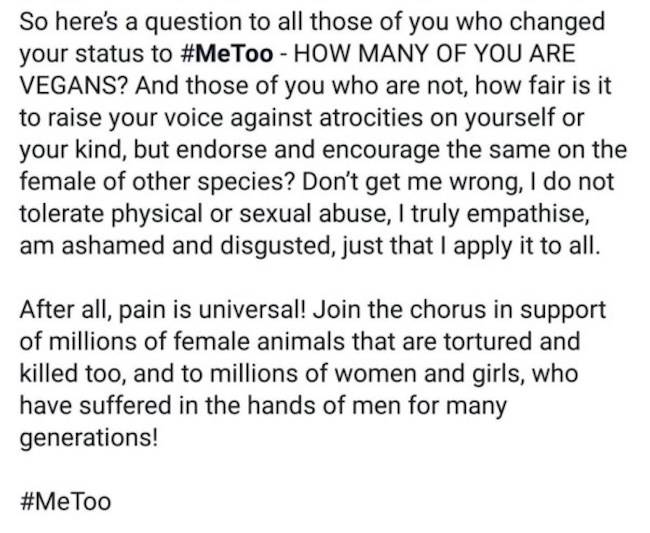
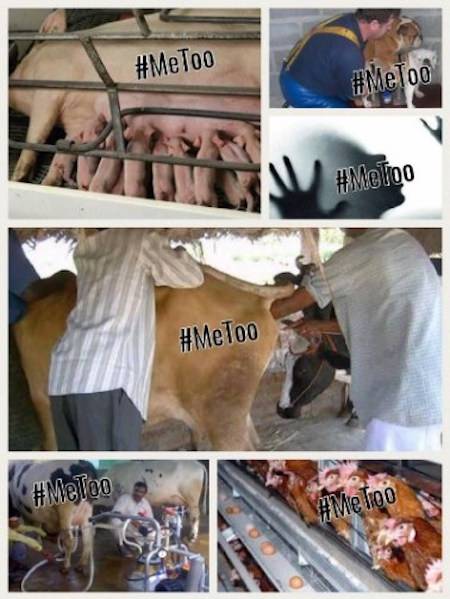
3. It is not men’s place to tell women how to end rape culture.
There are so many anti-speciesist women who can reach out to feminists about
total liberation. Men targeting sexual assault survivors during #MeToo,
demanding that they be vegan, was a typical example of men inserting
themselves where they don’t belong. Women are tired of being talked down to
by men, having them mansplain our experiences. Again, this is also relevant
to the number of nonvegan women who are likely to listen to you.
4. Acknowledge when you’re in the wrong. Allies make
mistakes; it happens. What’s important is to actively listen to
those who are educating you and make the necessary changes. Try to see your
advocacy from non-male and non-human perspectives and analyze whether
everything is being done to ensure the highest level of consideration.
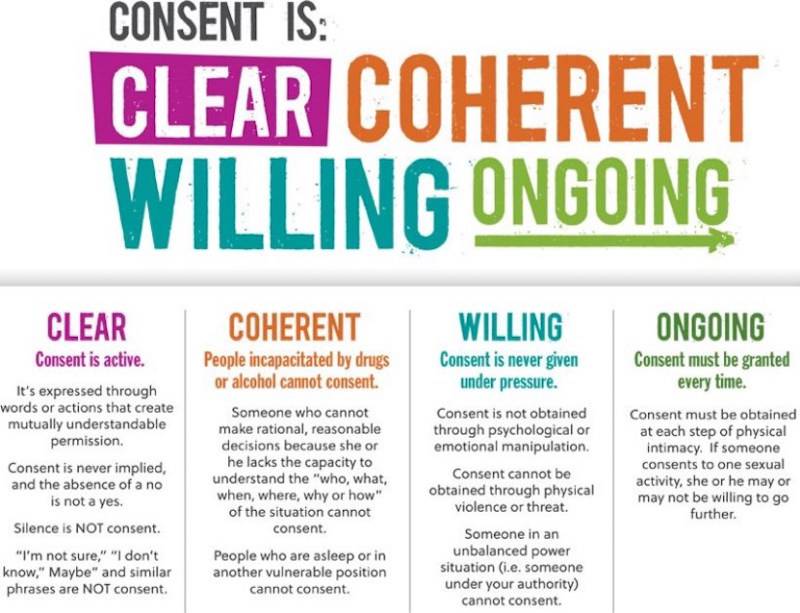
5. Take an unapologetic stance on total liberation. I
cannot take men seriously when they claim to care about women’s issues but
then never speak on feminism except when it’s to bash women for not being
vegan. When this happens, all I see is men taking advantage of an
opportunity to show their contempt for women. Show up for women when there’s
a vegan man being misogynistic. Call out rape culture within the animal
rights movement and hold men accountable for the culture they are
perpetuating.
6. People do not owe you a disclosure of their traumatic history.
This is a fairly new conclusion of mine, inspired by posts by Christopher
Sebastian and conversations with fellow vegan women. I've decided to include
this here after two separate public encounters of people demanding that my
usage of the word "rape" was disrespectful to survivors. These
confrontations are hurtful because they assume that I am not a survivor, or
that my experience does not matter as much as someone who is personally hurt
by the usage. In these situations I used to rely on my identity as a
survivor to emphasize my point, but no longer will I put myself through
living my rapes in order to justify my acknowledgement of nonhuman rape
survivors. Disclosure culture can lead us into terrible interactions that
make it seem as if getting raped is some sort of certification to be allowed
to talk about the realities of animal agriculture. I believe that
anyone--rape survivor or not--can articulate what is happening to animals in
the context of rape culture, but I also strongly feel that everyone--rape
survivor or not--should do so in a respectful way, following the tips I've
outlined above. This may be difficult to navigate at first, but
cross-species consideration is worth it.
What are you going to do to help end the commodification and exploitation of
people’s bodies? Will you stand up to humans who belittle the experiences of
animals, and organizations that belittle the experiences of women? Right now
there is a hen whose children are being taken away from her before they are
even born. There is a cow who is impregnated again and again until she is
seen as useless and is slaughtered. They are fellow victims of patriarchy,
and they deserve nothing less than our loud, fierce solidarity.
Return to Animal Rights Articles
Read more at The Meat and Dairy Industries
Read more at Egg Production








